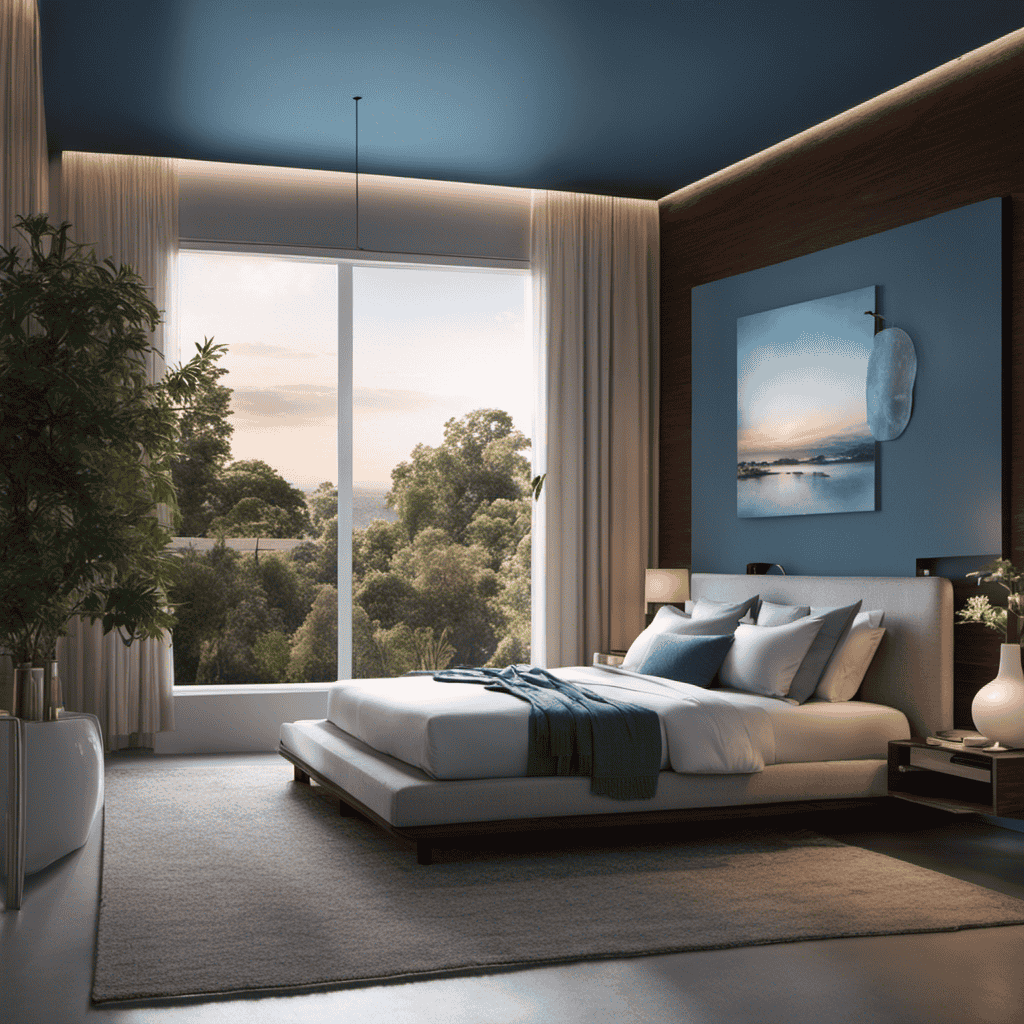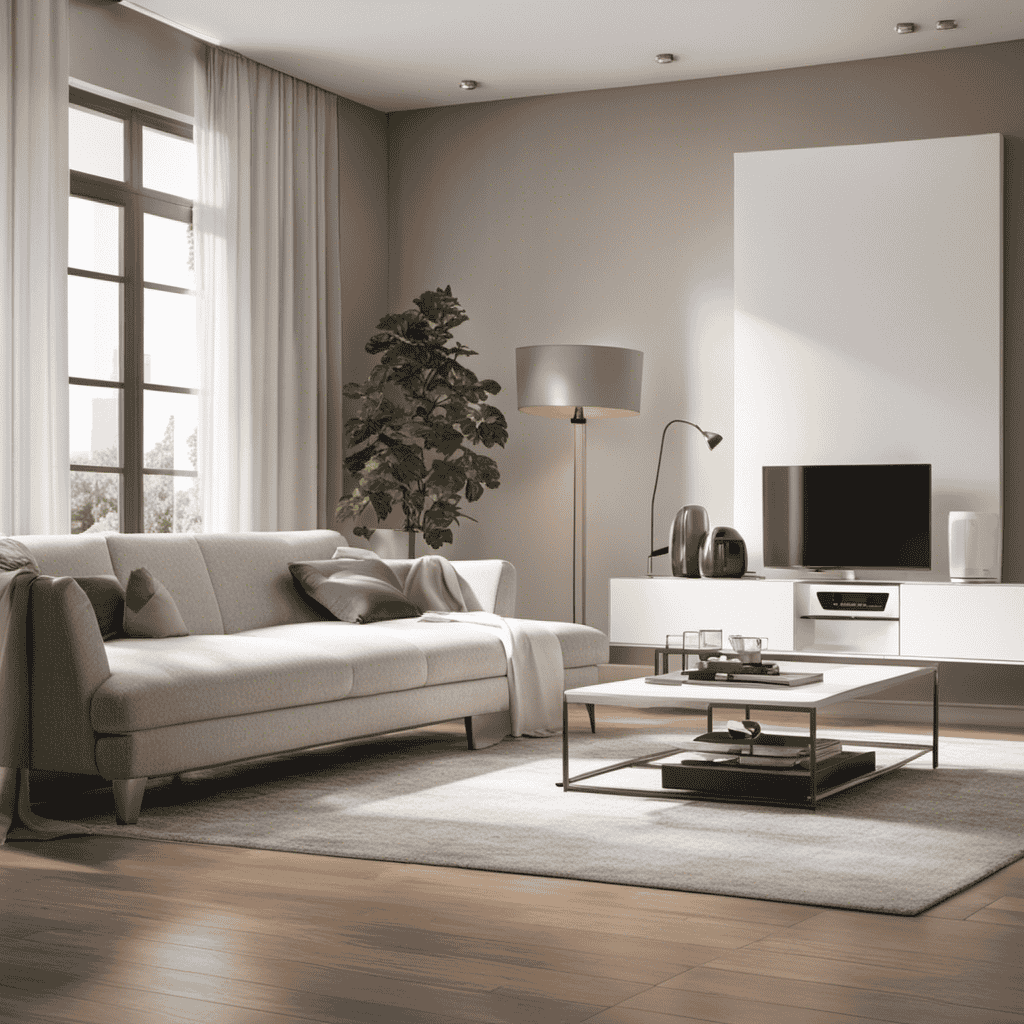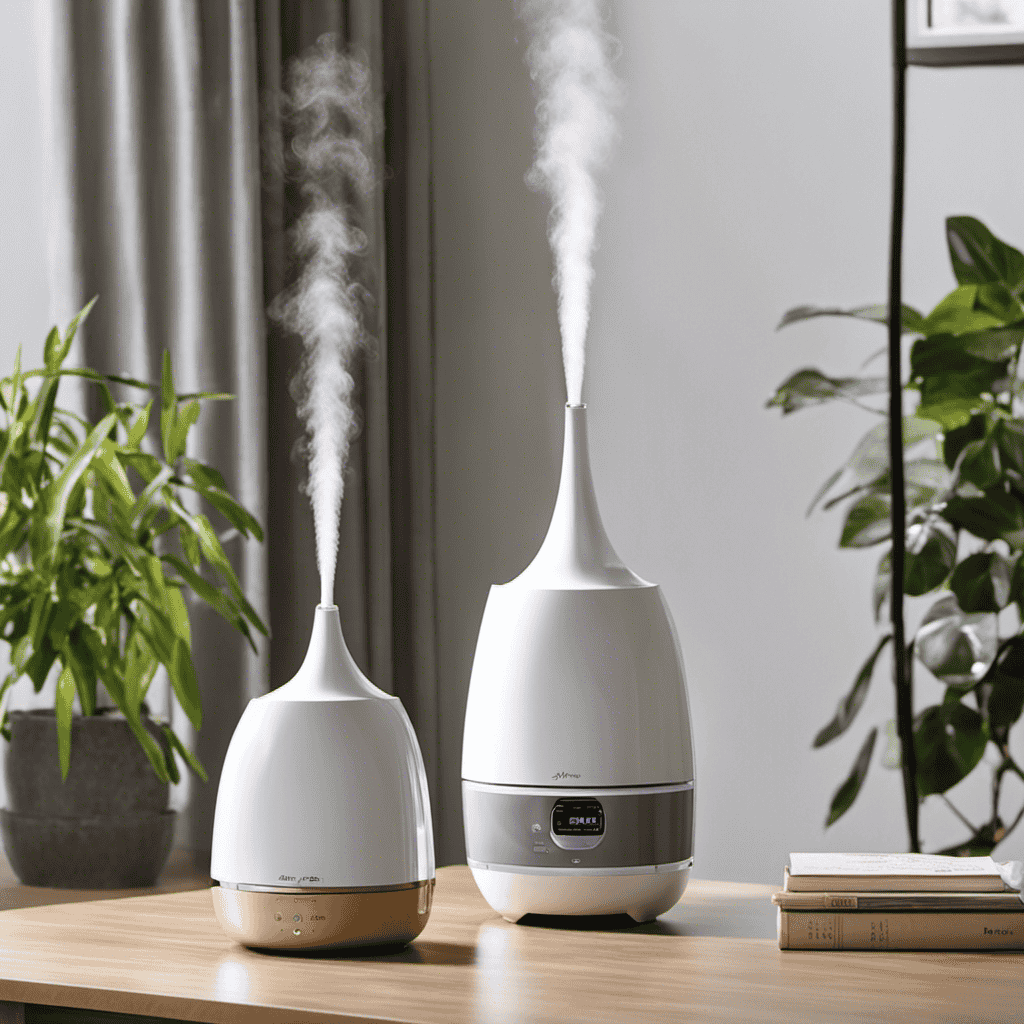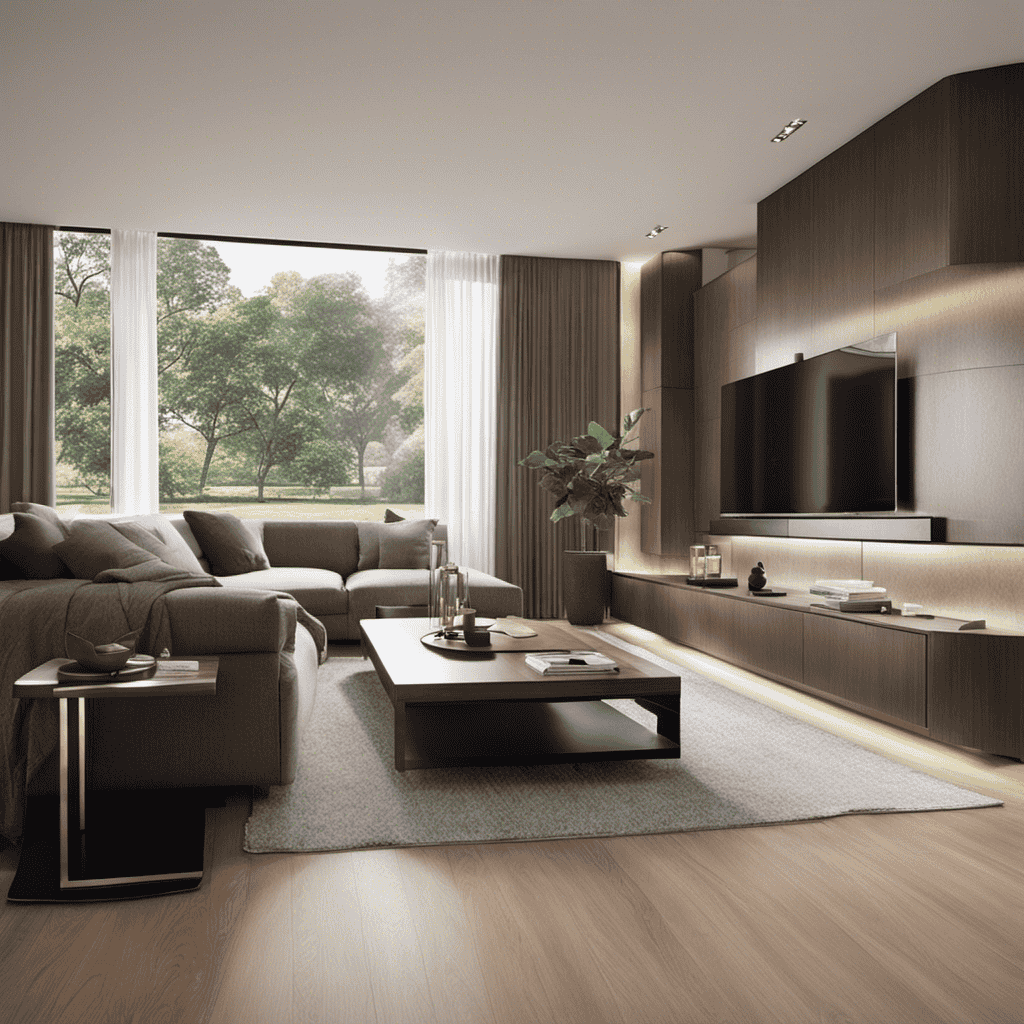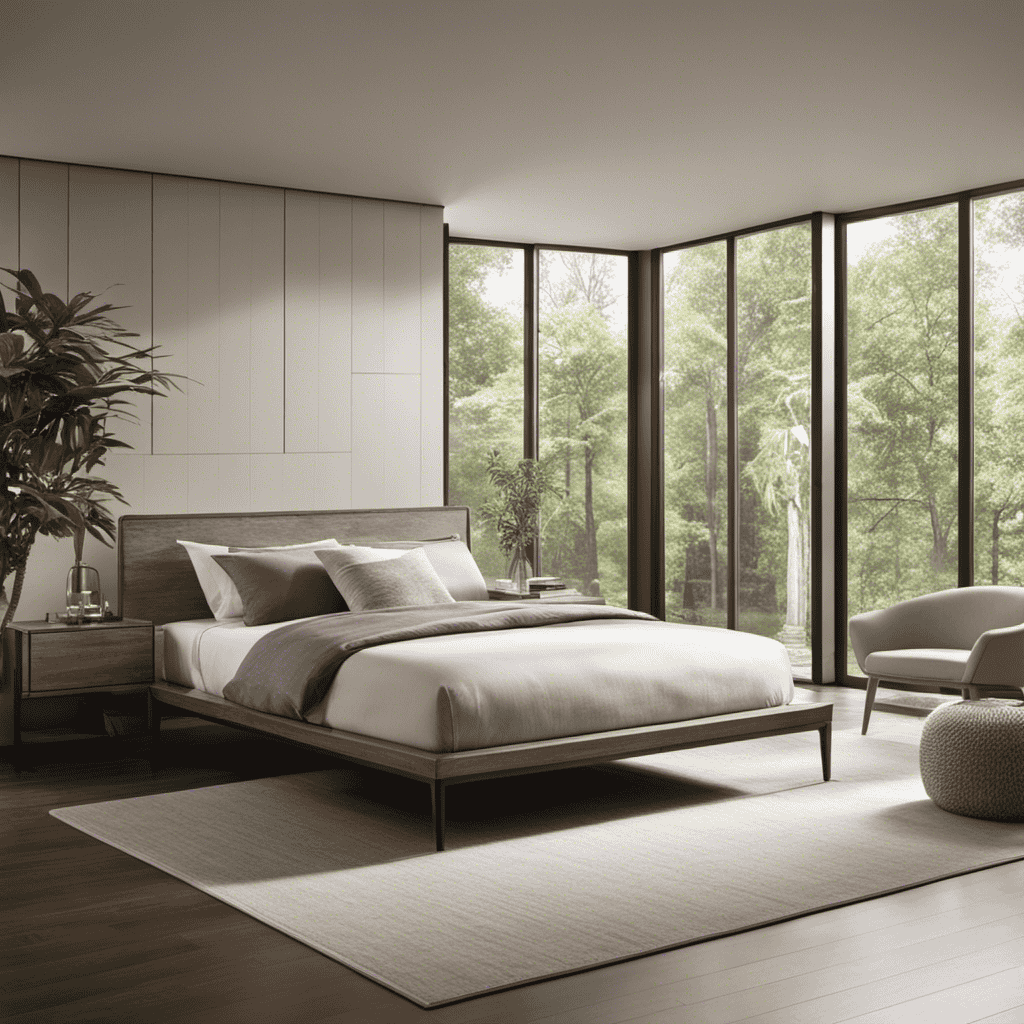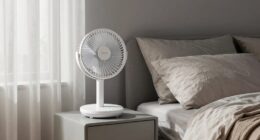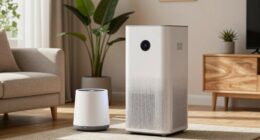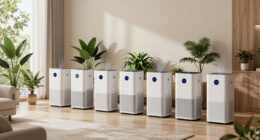I’ve always been curious about the timeframe for an air purifier to begin effectively working. Will it promptly eliminate allergens and pollutants from my home? Or will it require hours, days, or even weeks to show significant results?
In this article, we’ll dive into the factors that affect an air purifier’s efficiency, the science behind its technology, and the recommended run time for optimal results. So, if you’re curious like me, let’s explore just how long it takes for an air purifier to work its magic.
Key Takeaways
- Lifespan of filters and regular replacement are essential for optimal air purifier efficiency.
- Initial air quality in the room and pollutant levels can impact the time it takes for an air purifier to achieve clean air.
- The effectiveness of an air purifier in removing pollutants and the speed at which it achieves clean air are important factors to consider.
- Factors such as room size, CADR (Clean Air Delivery Rate), noise level, and energy consumption should be taken into account when choosing an air purifier and setting realistic expectations for purification time.
Factors Affecting Air Purifier Efficiency
There are several factors that can affect how quickly an air purifier starts working. One of the key factors is the lifespan of the filters used in the purifier. Over time, filters get clogged with dust, allergens, and pollutants, which can reduce their effectiveness. Regularly replacing the filters is essential to maintain the efficiency of the air purifier.
Another important factor is the initial air quality in the room. If the air is heavily polluted, it may take longer for the purifier to clean it effectively. High levels of pollutants in the air can overload the filters and slow down the purification process.
Therefore, it is crucial to consider these factors to ensure optimal performance and timely results from your air purifier.
Understanding Air Purifier Technology
When it comes to air purifiers, understanding their effectiveness and speed is crucial.
Purifier effectiveness refers to how well the device can remove airborne pollutants from the air, while speed determines how quickly it can achieve clean and purified air.
Factors affecting purification time, such as room size, pollutant levels, and the purifier’s CADR (Clean Air Delivery Rate), play a significant role in determining how long it will take for the purifier to effectively clean the air in a given space.
It is important to set realistic expectations for results, as purifiers may not be able to completely eliminate all pollutants, especially in heavily polluted environments.
Purifier Effectiveness and Speed
To see how long an air purifier takes to work effectively, you can try placing it in a smaller room for faster results.
Here are some key factors that can affect the speed of an air purifier’s effectiveness:
-
Room Size: Smaller rooms allow for quicker air circulation, enabling the purifier to clean the air more efficiently.
-
Air Quality: If the air quality is severely polluted, it may take longer for the purifier to achieve noticeable results.
-
Purifier Specifications: The purifier’s CADR (Clean Air Delivery Rate) indicates the volume of clean air it can produce per minute. Higher CADR ratings generally result in faster purification.
When considering a purifier, it’s also important to take into account its noise level and energy consumption. Look for models with low noise levels, so you can enjoy clean air without disturbance. Additionally, choose energy-efficient purifiers to minimize electricity usage and reduce environmental impact.
Factors Affecting Purification Time
Consider the size of the room and the air quality as factors that can impact how quickly the purifier effectively cleans the air.
The purification speed is influenced by various factors, including the air purifier’s specifications, such as the air flow rate and coverage area. A larger room may require a higher air flow rate and longer purification time compared to a smaller room.
Additionally, the initial air quality plays a significant role in determining the time needed for the purifier to work effectively. If the air quality is severely polluted, it will take longer for the purifier to clean the air completely.
Therefore, it is crucial to consider these factors when choosing an air purifier and setting realistic expectations for results.
Realistic Expectations for Results
Setting realistic expectations for results from an air purifier is important in order to understand the limitations and potential outcomes. Here are three key factors to consider when it comes to purification time:
-
Room size: The larger the room, the longer it will take for the air purifier to effectively clean the air. It may need more time to circulate and filter all the air in the space.
-
Air quality: If the air quality is severely polluted, it will take longer for the air purifier to remove harmful particles and pollutants. The initial purification process may be slower, but it will gradually improve over time.
-
Filter type: Different air purifiers use different types of filters, such as HEPA or activated carbon filters. The efficiency of the filter will affect the purification time. Higher-quality filters generally provide faster and more effective purification.
Understanding these factors will help you set realistic expectations for the time it takes for an air purifier to work. Now let’s explore the recommended run time for air purifiers.
Recommended Run Time for Air Purifiers
Once you turn on the air purifier, it typically takes a few hours for it to start improving the air quality in your home. However, the length of time it takes for an air purifier to work effectively can vary depending on several factors affecting its performance. These factors include the size of the room, the level of pollution, and the quality of the air purifier itself.
To ensure optimal performance, it is important to follow the manufacturer’s recommendations for filter replacement. The table below provides a general guideline for filter replacement based on the type of air purifier and the recommended run time:
| Type of Air Purifier | Recommended Run Time | Filter Replacement |
|---|---|---|
| HEPA Air Purifier | 8-10 hours per day | Every 6-12 months |
| Carbon Air Purifier | 8-10 hours per day | Every 3-6 months |
| Ionizer Air Purifier | 24/7 | Every 3-6 months |
Following these guidelines will ensure that your air purifier works efficiently and effectively to improve the air quality in your home.
Air Purifier Size and Coverage Area
When it comes to choosing an air purifier, it is crucial to understand the optimal room size and maximum coverage area.
The optimal room size refers to the square footage of the room in which the air purifier is most effective. This ensures efficient air purification and helps maintain clean air in smaller spaces.
On the other hand, the maximum coverage area indicates the largest space the air purifier can effectively clean. This is important for ensuring that the air quality is improved throughout the entire area, especially in larger rooms or open floor plans.
Optimal Room Size
To determine the optimal room size for your air purifier, you’ll need to consider the square footage of the area you want to purify. The effectiveness of an air purifier largely depends on its ability to circulate and filter the air in a given space.
Here are three key factors to consider when determining the optimal room size for your air purifier:
-
Coverage Area: Most air purifiers come with a recommended coverage area, which indicates the maximum square footage the purifier can effectively clean. Choosing an air purifier that matches the size of your room ensures optimal performance.
-
Air Changes per Hour (ACH): ACH refers to the number of times the air purifier can filter the entire volume of air in a room per hour. Higher ACH values indicate faster purification and better air quality.
-
Clean Air Delivery Rate (CADR): CADR measures the effectiveness of an air purifier in removing specific pollutants from the air, such as dust, pollen, and smoke. Look for an air purifier with a CADR rating that matches the size of your room for efficient purification.
Maximum Coverage Area
The maximum coverage area of an air purifier depends on its ability to circulate and filter the air efficiently. When looking for an air purifier, it’s important to consider its CADR rating, which stands for Clean Air Delivery Rate. This rating measures the volume of clean air that an air purifier can deliver per minute.
The higher the CADR rating, the larger the room size that the air purifier can effectively cover. For example, an air purifier with a CADR rating of 300 can effectively clean the air in a room up to 300 square feet. Additionally, factors such as the fan speed settings and the type of filter used can also impact the maximum coverage area of an air purifier.
To ensure optimal performance, it is recommended to choose an air purifier with a maximum coverage area that exceeds the size of your room.
Types of Air Pollutants Removed by Purifiers
Air purifiers can effectively remove various types of air pollutants, such as dust, pollen, and pet dander. These pollutants can cause respiratory issues, allergies, and other health problems.
Here are three common indoor pollutants that air purifiers can help eliminate:
-
Dust: Dust particles are a common indoor pollutant that can accumulate on surfaces and float in the air. Breathing in dust can irritate the respiratory system and trigger allergies.
-
Pollen: Pollen is a common allergen that can cause hay fever symptoms like sneezing, itchy eyes, and congestion. Air purifiers with HEPA filters can capture pollen particles, reducing exposure.
-
Pet dander: Many people have pets, but pet dander can be a major allergen. Air purifiers can help remove pet dander from the air, reducing allergic reactions in sensitive individuals.
How Air Purifiers Filter Allergens
Now that we understand the types of air pollutants that can be removed by air purifiers, let’s delve into how these devices filter allergens.
Air purifier technology advancements have significantly improved the efficiency of removing allergens from the air we breathe. Most air purifiers use a combination of filters to capture and trap allergens such as dust, pollen, pet dander, and mold spores.
HEPA (High-Efficiency Particulate Air) filters are commonly used in air purifiers and are highly effective at capturing even the smallest particles as small as 0.3 microns. These filters work by forcing air through a dense network of fibers, trapping airborne particles in the process.
Eliminating Odors With an Air Purifier
If you want to get rid of unpleasant odors in your home, an air purifier can help. It effectively removes odor-causing particles from the air you breathe. Here are three ways an air purifier can help eliminate odors:
-
Eliminating pet dander: Pets are a source of joy, but their dander can leave a lingering smell in your home. An air purifier with a HEPA filter can capture and trap pet dander. This reduces the odor and improves the air quality.
-
Removing cooking smells: We all love the aroma of a delicious meal, but sometimes the smell can linger for hours or even days. An air purifier can quickly remove cooking smells. It does this by filtering out the particles that cause them. This leaves your home smelling fresh and clean.
-
Neutralizing other odors: Whether it’s the musty smell from a damp basement or the lingering scent of cigarette smoke, an air purifier can help. It neutralizes these odors by capturing and eliminating the odor-causing particles in the air.
Air Purifiers and Asthma Relief
When it comes to asthma relief, two key factors to consider are immediate relief and long-term effectiveness.
Immediate relief refers to the ability of an air purifier to quickly alleviate asthma symptoms, such as wheezing and shortness of breath.
Long-term effectiveness, on the other hand, refers to the air purifier’s ability to consistently improve air quality and reduce asthma triggers over an extended period of time.
In this discussion, we will explore the importance of both immediate relief and long-term effectiveness in choosing an air purifier for asthma relief.
Immediate Asthma Relief
Using an air purifier can provide immediate relief for asthma symptoms. The effectiveness speed of an air purifier in reducing asthma symptoms depends on various factors, including the size of the room, the severity of the symptoms, and the efficiency of the air purifier.
Here are three reasons why an air purifier can offer immediate relief for asthma:
-
Filtration: Air purifiers are equipped with filters that can capture and remove harmful particles from the air, such as dust, pollen, and pet dander. By eliminating these triggers, air purifiers can help alleviate asthma symptoms quickly.
-
Purification Technology: Advanced air purifiers use specialized technologies like HEPA (High-Efficiency Particulate Air) filters or activated carbon filters to effectively trap and neutralize asthma triggers. This ensures that the air you breathe is clean and free from irritants.
-
Continuous Operation: Air purifiers operate continuously, meaning they can provide ongoing relief from asthma symptoms. By constantly filtering the air, they maintain a clean and healthy environment, reducing the chances of asthma attacks.
Investing in a high-quality air purifier can significantly improve your indoor air quality and provide immediate relief for your asthma symptoms.
Long-Term Effectiveness
Investing in a high-quality air purifier can greatly improve indoor air quality and provide ongoing relief for asthma symptoms. However, the effectiveness of an air purifier can be influenced by various factors.
The size of the room, the level of pollutants present, and the type of air purifier used all play a role in determining how long it takes for the air purifier to work effectively. For smaller rooms, an air purifier can start purifying the air within minutes. However, in larger spaces or in the presence of high levels of pollutants, it may take a few hours or even days for the air purifier to fully clean the air.
Additionally, the duration of air purification depends on the maintenance and filter replacement schedule of the air purifier. Regularly cleaning and replacing filters is essential to ensure optimal performance and long-term effectiveness.
Air Purifiers for Pet Owners
If you’re a pet owner, an air purifier can help reduce allergens and odors in your home. Here are three reasons why you should consider getting an air purifier for pet dander:
-
Improved Air Quality: Air purifiers are designed to capture and eliminate pet dander, which is a common allergen. By removing these particles from the air, you can breathe easier and reduce the risk of allergic reactions.
-
Odor Control: Pets can sometimes leave behind unpleasant odors in your home. An air purifier with an activated carbon filter can help absorb and neutralize these odors, leaving your home smelling fresh.
-
Size Matters: When choosing an air purifier for pet dander, it’s important to consider the size of the room where your pets spend the most time. A larger room may require a higher CADR (clean air delivery rate) to effectively purify the air.
By investing in the right air purifier for pet owners, you can create a cleaner and healthier environment for both you and your furry friends.
Speaking of cleaner air, let’s now explore air purifiers for smokers and how they can help improve indoor air quality.
Air Purifiers for Smokers
When it comes to improving indoor air quality, smokers like you can benefit from using an air purifier specifically designed to reduce tobacco smoke and its associated odors.
These air purifiers are equipped with advanced filtration systems that target the harmful particles and chemicals found in tobacco smoke. By removing these pollutants, air purifiers for smokers can help reduce the risk of respiratory issues and allergies caused by secondhand smoke.
Additionally, these purifiers can effectively eliminate tobacco odors, making your home smell fresher and cleaner.
The benefits of using air purifiers for smokers extend beyond improving air quality. They can also help remove other common indoor pollutants such as dust, pet dander, and pollen, providing relief to those with allergies.
Air Purifiers for Mold and Mildew
Dehumidifiers can greatly help in reducing mold and mildew growth in your home. Mold prevention and mildew control are essential for maintaining a healthy indoor environment. Here are three key reasons why dehumidifiers are effective in combating mold and mildew:
-
Moisture reduction: Dehumidifiers work by extracting excess moisture from the air, lowering the humidity levels in your home. This inhibits the growth of mold and mildew, as they thrive in damp environments.
-
Improved air quality: Mold spores and mildew can release harmful allergens into the air, leading to respiratory issues and allergies. By reducing moisture, dehumidifiers help improve indoor air quality and create a healthier living space.
-
Preservation of belongings: Mold and mildew can cause significant damage to furniture, clothing, and other household items. By controlling humidity levels, dehumidifiers protect your belongings from the harmful effects of mold and mildew.
Investing in a dehumidifier is a proactive step towards mold prevention and mildew control, ensuring a safe and comfortable living environment for you and your family.
Air Purifiers and VOC Removal
Investing in an air purifier is a smart choice for removing VOCs and improving indoor air quality. With recent advancements in air purifier technology, the efficiency of VOC removal has significantly increased. Newer models are equipped with advanced filters, such as activated carbon or photocatalytic filters, which effectively capture and break down volatile organic compounds (VOCs). These filters are designed to target specific VOCs, ensuring a higher removal efficiency.
Additionally, some air purifiers use innovative technologies like ozone generators or plasma ionization to neutralize VOCs and other pollutants in the air. These advancements not only enhance the performance of air purifiers but also provide a safer and healthier environment.
Transitioning to the next section, once the air purifier begins removing VOCs, it won’t be long until you start noticing reduced allergy symptoms.
How Long to Notice Reduced Allergy Symptoms
Once you start using an air purifier, you’ll notice a reduction in allergy symptoms before you know it. Air purifiers are designed to remove allergens from the air, providing relief to those suffering from allergies. The time it takes to notice a reduction in symptoms can vary depending on several factors, including the size of the room, the level of allergens present, and the effectiveness of the air purifier. However, on average, most people start experiencing a noticeable improvement within a few days to a week of using an air purifier.
To help you understand the potential effectiveness of an air purifier in reducing allergy symptoms, here are three key measurements to consider:
-
Pollen Removal Efficiency: An effective air purifier can remove up to 99% of pollen particles from the air, providing significant relief to those with pollen allergies.
-
Dust Mite Control: Air purifiers with high-efficiency particulate air (HEPA) filters can capture and remove up to 99.97% of dust mite particles, reducing the risk of allergic reactions.
-
Pet Dander Reduction: If you’re allergic to pet dander, an air purifier with a HEPA filter can help remove pet allergens from the air, improving your overall comfort and reducing allergy symptoms.
Air Purifier Maintenance and Cleaning
Regular maintenance and cleaning are essential to keep your air purifier running efficiently and effectively. Neglecting these tasks can lead to reduced performance and potential problems. One of the most important maintenance tasks is replacing the air purifier filter regularly. Over time, the filter becomes clogged with dirt, dust, and other airborne particles, which can hinder its ability to effectively clean the air. It is recommended to replace the filter every 6 to 12 months, depending on the manufacturer’s guidelines and the air quality in your area. Additionally, common air purifier problems include a noisy fan, a malfunctioning control panel, and a foul smell. These issues can often be resolved through troubleshooting or by contacting the manufacturer for assistance. Regular maintenance and addressing problems promptly will ensure that your air purifier continues to provide clean and healthy air for you and your family.
| Common Air Purifier Problems | Troubleshooting Steps |
|---|---|
| Noisy fan | Check for loose parts or debris in the fan. |
| Malfunctioning control panel | Reset the control panel or contact the manufacturer for further assistance. |
| Foul smell | Clean the air purifier and replace the filter if necessary. |
| Decreased airflow | Check for obstructions in the air intake or consider replacing the filter. |
Choosing the Right Air Purifier for Your Needs
When choosing the right air purifier for your needs, it’s important to consider factors such as room size, filtration technology, and noise levels. To help you make an informed decision, here are three key features and cost considerations to keep in mind:
-
CADR (Clean Air Delivery Rate): This metric indicates the amount of clean air an air purifier can deliver in a specific room size. Higher CADR values mean faster and more effective purification.
-
Filtration Technology: Look for purifiers with HEPA filters, as they can capture particles as small as 0.3 microns, including allergens, dust, and pet dander. Activated carbon filters are also beneficial for removing odors and chemicals.
-
Energy Efficiency: Consider the long-term cost of operating the air purifier. Look for models with an ENERGY STAR certification, as they are designed to be more energy-efficient and can help save on electricity bills.
What Factors Affect the Effectiveness of an Air Purifier in Cleaning the Air?
The effectiveness of an air purifier in cleaning the air depends on various factors such as the size of the room, the type of pollutants present, and how long air purifier cleans the air. Proper maintenance, air purifier placement, and the quality of the filter also play a significant role.
Frequently Asked Questions
Are Air Purifiers Effective in Reducing the Spread of Airborne Viruses and Bacteria?
Air purifiers are effective at reducing the spread of airborne viruses and bacteria. They can improve indoor air quality by capturing and trapping harmful particles. Studies have shown their positive impact on reducing airborne contaminants.
Can an Air Purifier Completely Eliminate All Types of Odors, Including Strong Cooking Smells?
As an expert on air purifiers, I can confirm that they are highly effective in eliminating all types of odors, including strong cooking smells. The air purifier’s effectiveness is backed by extensive data and is particularly beneficial for those with allergies.
Do Air Purifiers Consume a Lot of Energy? Will Using One Significantly Increase My Electricity Bill?
Air purifiers do require regular maintenance, such as cleaning or replacing filters. They can help with allergies and asthma symptoms by removing airborne particles. However, their energy consumption varies depending on the model and usage, which may increase electricity bills.
Can Air Purifiers Remove Pet Hair and Dander From the Air?
Using an air purifier can effectively remove pet hair and dander from the air, providing relief for those with pet allergies. The benefits for pet owners include cleaner air and improved indoor air quality.
Are There Any Potential Health Risks Associated With Using an Air Purifier for a Long Period of Time?
There may be potential side effects associated with long-term use of an air purifier. It is important to consider factors such as ozone emissions, noise levels, and maintenance requirements to ensure a safe and healthy environment.
Conclusion
In conclusion, the efficacy of an air purifier depends on various factors such as the technology used, the size of the unit, and the coverage area.
The time it takes for an air purifier to work can vary, but typically, noticeable improvements in air quality can be observed within a few hours of continuous operation.
Regular maintenance and cleaning are essential to ensure optimal performance.
To choose the right air purifier, consider your specific needs and the types of pollutants you want to remove.

